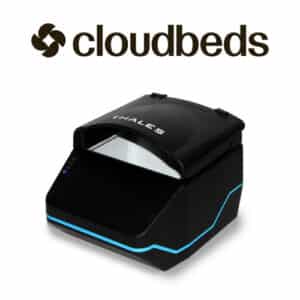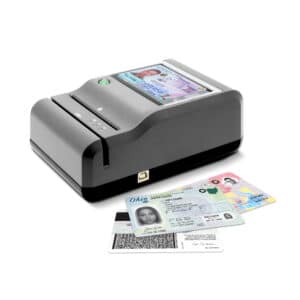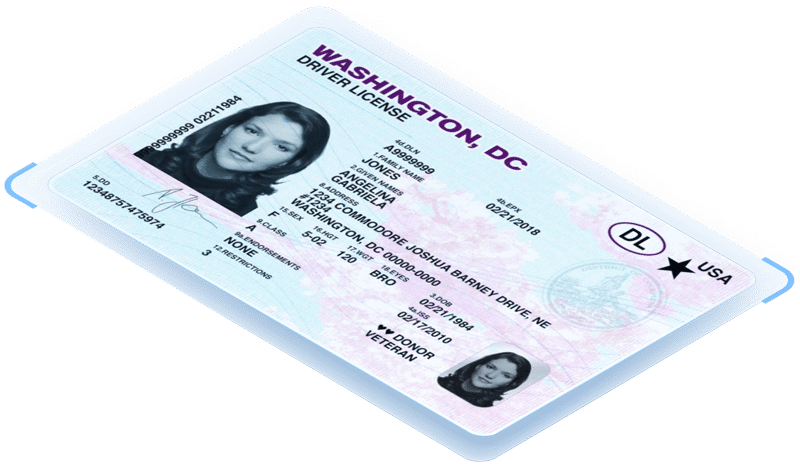Most travelers are familiar with the hotel check-in process: as a guest you walk in, and hand the front desk your ID and a credit card. After the front desk agent scans or reviews both documents, you’re checked in and handed your room key. But what does the hotel do with your ID, and is it required that they scan your ID? Why do they sometimes make a photocopy, and how is that paper copy of your drivers license stored by the hotel? Although checking a guest’s ID is a standard practice at almost all hotels, whether or not it is a requirement is a murky, legal area.
Each US state has certain requirements surrounding guest registers and the processes surrounding it. Here, we will break down the specific requirements in each state surrounding scanning IDs at a hotel.
Does a hotel need to scan your ID during check-in?
We gathered and reviewed requirements in the hospitality industry in all US states, to determine which states have requirements around ID verification, and which do not.
State | Is checking IDs required? | Additional notes |
|---|---|---|
| Alabama | No | Alabama does not have any requirements for hotels to scan IDs. ID checking is at the hotel’s discretion. |
| Alaska | No | Alaska does not have any requirements for hotels to scan IDs. ID checking is at the hotel’s discretion. |
| Arizona | No* | While hotels in Arizona aren’t required to scan IDs, establishments that sell alcohol are. So, if the hotel sells alcohol, they are required to check IDs, and are permitted to do so using ID scanners. |
| Arkansas | No | Arkansas does not have any requirements for hotels to scan IDs. ID checking is at the hotel’s discretion. |
| California | Yes | Every hotel operator must maintain a registry of information about each guest staying at the establishment. When utilizing ID scanning technology, hotels must ensure they follow California’s Consumer Privacy Act surrounding PII and data retention. |
| Colorado | No | Colorado does not have any requirements for hotels to scan IDs. ID checking is at the hotel’s discretion. |
| Connecticut | No | Connecticut does not have any requirements for hotels to scan IDs. ID checking is at the hotel’s discretion. |
| Delaware | No | Delaware does not have any requirements for hotels to scan IDs. ID checking is at the hotel’s discretion. |
| Florida | No* | Florida does not have any requirements for hotels to scan IDs. |
| Georgia | No* | Georgia does not have any requirements for hotels to scan IDs. ID checking is at the hotel’s discretion. ID scanning can be used, but requires obtaining consent from the ID owner prior to the scan. |
| Hawaii | No | Hawaii does not have any requirements for hotels to scan IDs. ID checking is at the hotel’s discretion. ID scanning at hotels is explicitly allowed in Hawaii and is a practice often utilized by hotels to reduce fraud and streamline processes. |
| Idaho | No | Idaho does not have any requirements for hotels to scan IDs. ID checking is at the hotel’s discretion. |
| Illinois | No | Illinois does not have any requirements for hotels to scan IDs. ID checking is at the hotel’s discretion |
| Indiana | No* | Indiana does not have any requirements for hotels to scan IDs. ID checking is at the hotel’s discretion If the hotel is selling alcohol to a patron, they need to ensure they remain compliant with IC 7.1-5-10-23. |
| Iowa | Yes | Iowa hotels shall keep and maintain guest records for 3 years showing name, residence, date of arrival, and date of departure. |
| Kansas | No* | Kansas does not have any requirements for hotels to scan IDs. ID checking is at the hotel’s discretion. If a hotel chooses to employ the use of ID scanning, they need to ensure compliance with Kansas statute 8-260.2. |
| Kentucky | No | Kentucky does not have any requirements for hotels to scan IDs. ID checking is at the hotel’s discretion. |
| Louisiana | No | Louisiana does not have any requirements for hotels to scan IDs. ID checking is at the hotel’s discretion. |
| Maine | Yes | All persons renting a room or rooms in a hotel or lodging house must be registered in the hotel register. When employing ID scanning, the hotel must be aware of applicable privacy laws. Customer data cannot be used to build a customer database. |
| Maryland | No | Maryland does not have any requirements for hotels to scan IDs. ID checking is at the hotel’s discretion. |
| Massachusetts | No | Massachusetts does not have any requirements for hotels to scan IDs. ID checking is at the hotel’s discretion. |
| Michigan | No* | While hotels in Michigan aren’t required to scan IDs, establishments that sell alcohol must ensure age requirements prior to the sale. So, if the hotel sells alcohol, they are required to check IDs, and are permitted to do so using ID scanners. |
| Minnesota | Yes | It is required for a guest register to be kept. The information must include name and home address. If traveling by car – vehicle registration, make/model, and other identifying letters or characters on the license plate. Records must be kept accurate and orderly for one year. |
| Mississippi | No | Mississippi does not have any requirements for hotels to scan IDs. ID checking is at the hotel’s discretion. |
| Missouri | No | Missouri does not have any requirements for hotels to scan IDs. ID checking is at the hotel’s discretion. |
| Montana | No | Montana does not have any requirements for hotels to scan IDs. ID checking is at the hotel’s discretion. |
| Nebraska | No* | Nebraska does not have any requirements for hotels to scan IDs. ID checking is at the hotel’s discretion. |
| Nevada | No | Nevada does not have any requirements for hotels to scan IDs. ID checking is at the hotel’s discretion. |
| New Hampshire | No | New Hampshire is the only US state which explicitly prohibits most instances of ID scanning. |
| New Jersey | No | New Jersey does not have any requirements for hotels to scan IDs. ID checking is at the hotel’s discretion. |
| New Mexico | No | New Mexico does not have any requirements for hotels to scan IDs. ID checking is at the hotel’s discretion. |
| New York | No* | New York does not have any requirements for hotels to scan IDs. ID checking is at the hotel’s discretion. Be mindful of New York State PII laws should your hotel choose to use ID scanning when verifying an ID. |
| North Carolina | No* | North Carolina does not have any requirements for hotels to scan IDs. ID checking is at the hotel’s discretion. |
| North Dakota | No | North Dakota does not have any requirements for hotels to scan IDs. ID checking is at the hotel’s discretion. |
| Ohio | No* | Ohio does not have any requirements for hotels to scan IDs. ID checking is at the hotel’s discretion. |
| Oklahoma | No* | While hotels in Oklahoma aren’t required to scan IDs, establishments that sell alcohol are. So, if the hotel sells alcohol, they are required to check IDs, and are permitted to do so using ID scanners. |
| Oregon | No | Oregon does not have any requirements for hotels to scan IDs. ID checking is at the hotel’s discretion. |
| Pennsylvania | No* | Pennsylvania does not have any requirements for hotels to scan IDs. ID checking is at the hotel’s discretion. |
| Rhode Island | No | Rhode Island does not have any requirements for hotels to scan IDs. ID checking is at the hotel’s discretion. |
| South Carolina | No | South Carolina does not have any requirements for hotels to scan IDs. ID checking is at the hotel’s discretion. |
| South Dakota | No | South Dakota does not have any requirements for hotels to scan IDs. ID checking is at the hotel’s discretion. |
| Tennessee | No | Tennessee does not have any requirements for hotels to scan IDs. ID checking is at the hotel’s discretion. |
| Texas | No* | Texas does not have any requirements for hotels to scan IDs. ID checking is at the hotel’s discretion. Please note, if you employ ID scanning into the check in process, the data scanned cannot be stored. The identity can be verified using said ID, but nothing else can be done with the information. |
| Utah | No | Utah does not have any requirements for hotels to scan IDs. ID checking is at the hotel’s discretion. Utah does require ID scanning for alcohol sales. |
| Vermont | No | Vermont does not have any requirements for hotels to scan IDs. ID checking is at the hotel’s discretion. |
| Virginia | No* | Virginia does not have any requirements for hotels to scan IDs. ID checking is at the hotel’s discretion. Please note, if you employ ID scanning into the check in process, the data scanned cannot be stored. The identity can be verified using said ID, but nothing else can be done with the information. |
| Washington | No | Washington does not have any requirements for hotels to scan IDs. ID checking is at the hotel’s discretion. |
| Washington D.C. | No | Washington D.C. does not have any requirements for hotels to scan IDs. ID checking is at the hotel’s discretion. |
| West Virginia | No* | While hotels in West Virginia aren’t required to scan IDs, establishments that sell alcohol are. So, if the hotel sells alcohol, they are required to check IDs, and are permitted to do so using ID scanners. |
| Wisconsin | No | Wisconsin does not have any requirements for hotels to scan IDs. ID checking is at the hotel’s discretion. |
| Wyoming | No | Wyoming does not have any requirements for hotels to scan IDs. ID checking is at the hotel’s discretion. |
No* – Not required but there may be caveats when the sale of age restricted products are involved.
Why do hotels check guest IDs?
In most instances, hotels check guest IDs to keep updated guest manifests. The primary purpose of accurate guest manifests is fraud reduction; by verifying someone’s identity and keeping a log of their stay, those fraudsters who might attempt a chargeback, or to pay with someone’s stolen information are easily identified.
Additionally, ID verification helps to ensure guest safety. Verifying someone’s identity via identity verification software helps to keep unwanted patrons from wandering the premises and risking the well-being of other guests, and ensures the hotel staff is aware of everyone on the premises at any given time.
Legal requirements also play a major role in why hotels check guest IDs. Regardless of whether hotels are required to scan IDs using an ID scanner, most states still require hotels to keep a guest manifest for a set period of time. This information often includes name, D.O.B., address, and even sometimes your license plate information (when applicable). So whether the hotel scans your ID, or just enters your information manually, they still have to keep the personal information of every guest for a certain period of time (dependent on state regulations).
Benefits of ID scanning for hotels
Regardless of whether ID scanning at hotels is required or optional in your state, the benefits of implementing ID scanning into your check-in process are significant.
- Streamline processes
- Reduce fraud
- Automatically sync to property management system (PMS) such as Cloudbeds
- Manage “do not rent” lists
- Easily accessible records for guest manifest compliance purposes
- Eliminate photocopies
By utilizing an ID scanner, you reduce the need for manual entry of ID information which not only cuts down on time, but helps to eliminate human error. Combined with either VeriScan or ParseLink, the guest identity can also be confirmed and matched to the ID presented, thus creating a safer environment for other patrons staying at your hotel.
ParseLink also has the ability to sync to any existing property management system (PMS) your hotel may be using. So whether you’re using Cloudbeds, Choice, Oracle, or something different, the ParseLink platform is still able to send the data scanned from the ID directly into those systems.
Top ID scanners for hotels
Can you check into a hotel without an ID?
Several states (see above) require that the hotel confirm your ID at check-in, so your ability to check in to a hotel without an ID may vary by state. Major hotel chains also are likely to have policies that require guests present an ID at check-in.
Why hotels should scan IDs and passports
Requirements surrounding ID scanning are constantly changing, but regardless of whether ID scanning is required during the hotel check in process or because you’re selling alcohol to a hotel guest, we can ensure you remain compliant.








